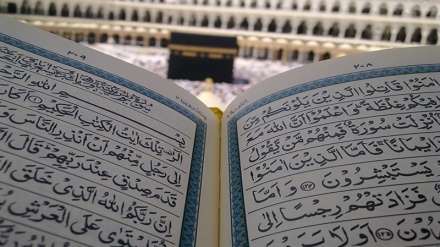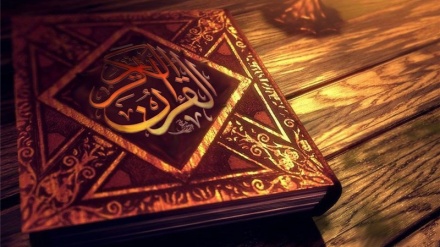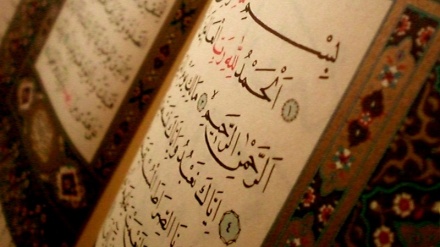Path towards Enlightenment (1018)
Salaam, and welcome to our latest episode of “Path towards Enlightenment”, which is an endeavour to make you and us familiar with an easy and fluent explanation of God’s Final Scripture to all mankind, the holy Qur’an that was revealed to the Last and Greatest of all Messengers, Prophet Muhammad (blessings of God upon him and his progeny).
As you know, for the last two weeks we have been presenting to you an explanation of “Surah Tahreem”, which mentions the intrigues of two of the several wives the middle-aged Prophet had to marry in the last ten years of his life in order to break the taboos of the age of ignorance, following the passing away of his loyal wife, Hazrat Khadija (peace upon her) with whom he had spent 25 long blissful years without taking any other spouse. These two women who were accomplices of each other and whose names have been mentioned in books of hadith and history, including those of our Sunni brethren, need not be repeated here, caused offence to the Prophet. God thus warned them of dire consequences of their misdeeds unless they repent; and He consequently urges all believers to be obedient to Divine Commandments in order to guard themselves and their families against Hellfire. The Surah cites examples of two of the virtuous women, that is, Asiya the wife of the tyrannical Pharaoh of Egypt, and the Virgin Mary – the mother of Jesus (peace upon them). It also gives examples of two of the wicked women, by referring to the disbelieving and disobedient wives of the Prophets Noah and Lot.
Today, we will complete explanation of this Surah, and here we recite Ayah 9, which reads:
“O Prophet! Strive resolutely against the faithless and the hypocrites, and be severe with them; their abode will be hell and it is an evil destination.”
If you might recall, in our explanation of the previous Ayahs of this Surah last Friday, we said that we should always be watchful of our words and deeds with firm belief in the Day of Resurrection, the reward of Paradise, and the punishment of the fire of Hell, since these factors are effective in ensuring righteous actions and virtuous behaviour. We also said that personal examples set by parents and elders regarding self-reform, good deeds, and abstinence from sins, have positive effects on the children, the family members, and consequently on the society. In contrast, those with neither belief in God nor the teachings of the Prophets are unbelievers, while those who claim to be Muslims but distort the Divine message are hypocrites. Thus, these two groups of people are perpetual losers, suffering the consequences of their evil deeds by being cast into Hell for ignoring the blessings of the All-Merciful Lord and the respite given to them.
The Ayah that we recited to you now is God’s commandment to the Prophet to resolutely strive against unbelievers and the hypocrites with severity for their constant harassment of believers. In Arabic, this determined confrontation with falsity is called ‘jihad’, which means striving in the way of God through various means such as rational discourses, using monetary resources to prevent people from evil plots, and if the need arises, to provide weapons to Muslims to protect themselves from the military attacks of the enemies. The modern day enemies of Islam have deliberately distorted the word ‘jihad’ to mean ‘holy war’ in order to depict Muslims as aggressive and thus mislead the unsuspecting people. The final destination, however, of the unbelievers and hypocrites is Hell for their unabated evil, as punishment for their ingratitude to the respite of life and the other blessings of the All-Merciful Lord.
We learn the following points from this Ayah:
- Islamic faith is comprehensive and reflects both compassion and severity in their proper places in order to resolve problems and remove dangers.
- Those whose hearts are devoid of belief despite their claim to be Muslims are called hypocrites for their pretentions towards believers in order to conceal their inner animosity and back-stabbing habit of siding with the enemies of Islam.
- Jihad is an all-comprehensive word meaning resolute struggle and sincere striving in the way of God and for the good of the society, through various means, including ideology, cultural measures, monetary help, media campaign, diplomacy, and of course, adequate defence readiness.
Let us now listen to Ayah 10 of Surah Tahreem:
“Allah draws an example for the faithless: the wife of Noah and the wife of Lot. They were under two of our righteous servants, yet they betrayed them; so they did not avail them in any way against Allah, and it was said [to them], ‘Enter the Fire along with those who enter.”
If you remember, the opening Ayahs of this Surah which we explained a couple of weeks ago, were about two of the Prophet of Islam’s wives, who used to cause inconvenience to him and were duly warned by God of the fire of Hell as evil consequence for their actions if they do not repent and seek forgiveness in the Divine Court. Here, the Almighty Creator further warns the disbelievers by citing the cases of two of the Prophets of the past, that is, Noah and Lot, both of whom had a disobedient spouse amongst their wives. These two women, though living centuries apart, conspired with the enemies of humanity against their respective husbands but failed in their evil designs, and since they did not repent they ended up in the blazing fires of Hell.
The point is that the bonds of marriage of these two erring women with their respective husbands, the Prophets Noah and Lot, did not save them from the Wrath of the All-Merciful God. Thus, this Ayah is a warning to the two mischievous wives of the Prophet of Islam against hurting their husband and imagining that their marriage with him has made them immune from Divine punishment. This is also a warning to all other Muslims.
Here, it should be mentioned that none of these erring wives, neither of the Prophets Noah and Lot, nor of the Prophet of Islam, were unchaste, but their major sin was lack of belief in the Divine mission of their husbands as is clear from their evil actions. This means family bonds have no room in Divine Justice and every person is be rewarded or punished as per his/her deeds after being shown unending mercy. It is worth noting that the erring wives of Prophet Noah and Prophet Lot, perished during the lifetime of their respective husband – one drowned in the great deluge and the other buried alive in the shower of stones. As for the two erring wives of Prophet Mohammad (blessings of God upon him and his progeny), they unfortunately disobeyed his instructions by opposing after his departure from the mortal world, his Divinely-designated Successor, Imam Ali ibn Abi Taleb (AS), whom Almighty Allah calls “Saleh al-Momineen” or the “Most Virtuous of Believers” in Ayah 4 of this same Surah, as the firm protector of the Prophet, along with Archangel Gabriel.
This Ayah teaches us that:
- Blood or matrimonial ties with a Prophet, will not save any erring son, daughter, and wife from Divine punishment.
- Like all human beings, the family members of a prophet have been given free choice to discern right from wrong, and face the consequences.
- Righteous people should properly groom their wife and children, since the danger of disbelief and disobedience lurks in the families of prophets as well.
With recitation of Ayahs 11 and 12, we conclude our explanation of Surah Tahreem as well as this week’s episode:
“And Allah draws an example for those who have faith: the wife of Pharaoh, when she said, ‘My Lord! Build me a home near You in Paradise. And deliver me from Pharaoh and his conduct, and deliver me from the wrongdoing lot.”
“And Mary, daughter of Imran, who guarded the chastity of her womb, so We breathed into it of Our spirit. She confirmed the words of her Lord and His Books, and she was one of the obedient.”
In these Ayahs, the Almighty Creator gives examples of two of the most virtuous ladies with firm faith, by referring to the Egyptian tyrant Pharaoh’s God-conscious wife, Asiyah, who believed in the mission of Prophet Moses, and to the Virgin Mary the Immaculate Mother of the miraculously born Prophet Jesus (peace upon them)
Asiyah, despite living in a luxurious palace with all amenities deplored the evil ways of the faithless Pharaoh including his slaughtering of the newborn sons of the Israelites, with constant prayer to God to save her from her evil husband and to grant her a house in Paradise. She had adopted Moses as a son and later believed in his prophethood, as a result of which she was brutally tortured to death by the Pharaoh, thereby gladly embracing martyrdom and eternal life.
As for the Virgin Mary, her devout worship and detachment from material life brought gifts of fruits from Paradise and the miraculous birth of Prophet Jesus, despite the fact that no man had ever touched her. Mary stood firm against the evil ways and false accusations of the corrupt Israelites, and is the only woman mentioned by name by God Almighty in the Holy Qur’an – as many as 30 times:
Thus, these two ladies are considered role model of feminine virtues for all faithful females, and are part of the Peerless Group of the Four Most Perfect Ladies of all time, with the other two being the Prophet of Islam’s faithful wife, Hazrat Khadija and his Infallible Daughter, Hazrat Fatema az-Zahra (peace upon them), the most noble lady of all times.
From these Ayahs we learn the following points;
- In addition to the Prophets and the Imams, certain virtuous females have been chosen by God as role models for human societies.
- On no account can the environmental conditions or the type of society justify disobedience of God in any era and place, as is evident by the firmness of faith and chastity of Asiyah and the Virgin Mary.
- True believers always seek the satisfaction of God Almighty and prefer Paradise to palaces on earth.
- Chastity of the mother greatly influences the spirit and personality of the child, and thus virtuous sons and daughters are the products of chaste God-conscious mothers.
On this note we bid you goodbye, and God bless you until our next episode which will start with explanation of Surah al-Mulk, number 67 in the serial order of the compilation of the Holy Qur’an.
RM/AS/SS


